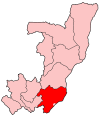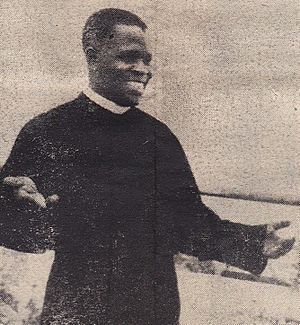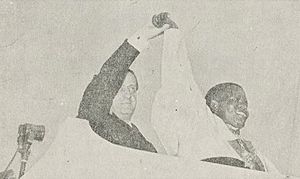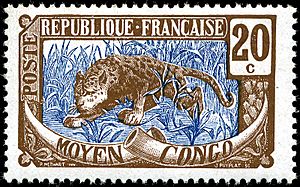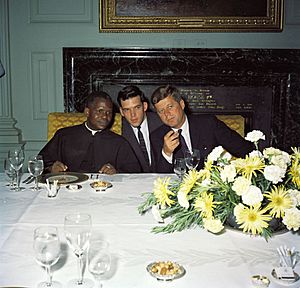Fulbert Youlou facts for kids
Quick facts for kids
Fulbert Youlou
|
|
|---|---|
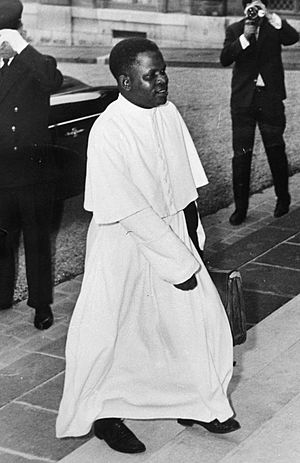
Fulbert Youlou in 1963
|
|
| 1st President of the Republic of the Congo | |
| In office 15 August 1960 – 15 August 1963 |
|
| Vice President | Stéphane Tchichelle Jacques Opangault |
| Preceded by | None |
| Succeeded by | Alphonse Massemba-Débat |
| 2nd Prime Minister of the Republic of the Congo | |
| In office 8 December 1958 – 21 November 1959 |
|
| Preceded by | Jacques Opangault |
| Succeeded by | Post abolished, 1959–1963; Alphonse Massemba-Débat |
| Personal details | |
| Born | 19 July 1917 Madibou, Moyen-Congo |
| Died | 6 May 1972 (aged 54) Madrid, Spain |
| Nationality | Congolese |
| Political party | Democratic Union for the Defence of African Interests |
Fulbert Youlou (born June or July 1917 – died May 6, 1972) was a Roman Catholic priest who later became a nationalist leader and politician in the Republic of the Congo. He made history as the first President of the Republic of the Congo when it gained its independence.
In August 1960, Youlou led his country to become independent. In December 1960, he organized a big meeting in Brazzaville. There, he talked about the benefits of a free market economy and spoke against communism. Three years later, he left power. Youlou made many people unhappy when he tried to create a one-party system and arrested union leaders in August 1963. This led to a major uprising known as the "Trois Glorieuses" (Three Glorious Days). He resigned because many people were against his government.
Contents
Early Life and Becoming a Priest
Fulbert Youlou was born on July 19, 1917, in Madibou, a place in the Pool Department. His last name, Youlou, means "Grape" in the Lari language. He was the youngest of three boys and belonged to the Lari group, part of the larger Kongo ethnic group.
When he was nine, he was baptized and given the Christian name Fulbert. In 1929, he started studying at the Petit Séminaire in Brazzaville. He was a very good student and was sent to Akono in Cameroon to finish his high school studies. After that, he went to the Grand Séminaire in Yaoundé, where he excelled in philosophy. There, he met other future leaders like Barthélemy Boganda from the Central African Republic and Andre-Marie Mbida from Cameroon.
After his studies, he returned to the Congo and taught at the Seminary in Mbamou. He then went to Libreville to complete his studies in theology. He finished his final studies in Brazzaville. Fulbert Youlou became a priest on June 9, 1946. He worked at the Saint-François parish in Brazzaville, where he led many youth groups, sports activities, and Catholic organizations. He also visited the general hospital and the prison.
Getting Involved in Politics
A Priest in Politics
Fulbert Youlou was very interested in politics. With encouragement from Father Charles Lecomte, he decided to run in the local elections of 1947 for the Pool district. However, he lost the election. He realized that to be elected, he needed to show he was not just supported by the colonial administration or the church. After this, he began to support the African resistance against colonial rule.
His superiors in the church were not happy with his political activities. In October 1953, a complaint was made against him. As a result, he was moved in November 1954 to a mission in the forest at Mindouli, where he became the headmaster of a Catholic school.
While at Saint-François, Youlou became known as a powerful speaker among the Lari people. Many Lari followed a movement called Matswanism, which challenged colonial rule. Youlou managed to connect with this movement, taking charge of the Amicale, a self-help group founded by the movement's leader. This helped him gain influence among its followers and the Lari youth. His punishment by the church also made him seem like a victim of the European-dominated church, which further strengthened his role as a leader.
A Leader and a Symbol
In October 1955, because of his image as a revolutionary, a council of Kongo people chose Youlou to represent them in the upcoming elections. When he announced his candidacy, his bishop tried to stop him. He was even forbidden from wearing his priest's robe (cassock) and from leading Mass. However, the Kongo people supported him, giving him money and even a car with a driver.
At first, Youlou's supporters saw him as a special figure, partly because he was a priest. He became a symbol of resistance against colonial rule. There was a story that he would bathe in the Loufoulakari falls, where a Kongo leader had been executed by the colonizers. People said his clothes stayed dry even when he was in the water.
This mystical image was part of his election campaign. His supporters, especially the Bacongo militants, sometimes used violence in their political actions. On December 12, 1955, his supporters called for those who didn't join Youlou to be "whipped." On December 28, the house of one opponent was burned down, and his family was killed. The tension grew very high on election day, October 10, 1956. In Bacongo, young Lari people attacked voters they suspected of not supporting Youlou. The authorities had to send security forces to protect the voting places. The violence continued for two more days, with houses destroyed and many people hurt. Youlou and one of his opponents, Jacques Opangault, asked for calm on the radio.
A week later, the election results were announced. The current representative, Jean-Félix Tchicaya, was re-elected. Youlou came in third. His supporters then collected money so he could travel to Paris. This trip helped him make new connections.
Gaining Power
The Path to Leadership
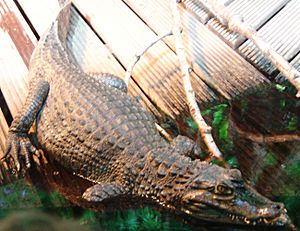
On May 17, 1956, Youlou started his own political party, the Union démocratique de défense des intérêts africains (UDDIA). This party competed with others, like the Congolese Progressive Party (PPC) and the African Socialist Movement (MSA) led by Opangault. The symbol of Youlou's new party was the crocodile, which represented strength. The UDDIA was against communism and supported Christian values. It attracted many politicians from other parties. Youlou's support grew beyond his home regions to include Kouliou. The party also had a very active women's group called Femmes-Caïmans, which recruited many women in Brazzaville.
In November 1956, Youlou ran for mayor of Brazzaville. French colonial officials knew about other African leaders who had risen to power quickly, and they wanted to avoid trouble. They believed they could use Youlou's influence among the Lari people. The municipal elections took place on November 18, 1956. The UDDIA won clearly in Brazzaville, Pointe-Noire, and Dolisie. Youlou defeated Jacques Opangault and became the first black elected mayor in French Equatorial Africa. His party won 23 seats, while his opponents won fewer.
Support for Tchicaya's party almost disappeared, leaving Opangault and Youlou as the main political rivals in the March 31, 1957, elections for the local government. Even with their earlier successes, the UDDIA's Vice-President, Simon Kikounga N'Got, left and started his own party. In the end, the UDDIA came second with 25 seats, while Opangault's coalition won 42 seats. After talks, a coalition government was formed between Opangault's and Youlou's parties. Each party got five government positions. Opangault became the vice-president. Youlou took the ministry of agriculture, which allowed him to travel widely across the country.
Political Challenges
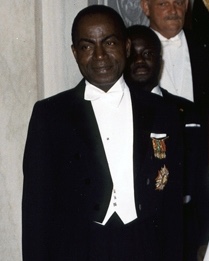
During the March 1957 elections, some leading colonists supported Youlou. In September 1957, they helped him gain a representative from another party, Georges Yambot. This gave the UDDIA a majority in the Assembly. This made Opangault very angry. Youlou was then appointed to the Vice-Presidency. Opangault's party protested strongly. The situation became very tense when Yambot was taken away on November 24, 1957, to force him to resign. The Governor managed to find a solution: Opangault was made Vice-President again, and the UDDIA kept its new majority in the Assembly.
In January 1958, the relationship between the two parties got worse. Youlou decided to send his party members to Dolisie, a stronghold of Opangault's party. Fights broke out between supporters of both sides, leading to many people being hurt. Paris, tired of these clashes, ordered the two Congolese leaders to control their followers.
In May 1958, Youlou strengthened his position even more. On May 5, a European member of the UDDIA, Christian Jayle, was elected to lead the territorial Assembly. Also, Youlou's party became the main partner of the pan-African party of Félix Houphouët-Boigny in the Congo. This gave Youlou's party more support from Paris and local authorities.
A Change in Government
Even though he had some disagreements with Charles de Gaulle, Youlou supported the "Yes" vote in the referendum on the French Community on September 28, 1958. This position received 93% of the votes, which helped the Congo gain more self-rule.
On November 28, 1958, the Territorial Assembly met to create new institutions for the country. The UDDIA and Opangault's party could not agree on the constitution. The atmosphere was very tense, with supporters of Opangault gathering around the government building. The deputies argued as they arrived. Finally, Opangault's deputies walked out of the Assembly in protest, leaving Youlou's party with a majority. Youlou then declared the Republic on his own, passed constitutional laws, and changed the Territorial Assembly into a legislature. With a unanimous vote from the 23 deputies present, Youlou was appointed head of the temporary government. Because Opangault continued to call for conflict, Youlou moved the capital from Pointe-Noire to Brazzaville.
The opposition, led by Opangault, called this action a "constitutional coup d'état" and threatened to cause trouble in Brazzaville. The next day, Opangault's deputies met alone in Pointe-Noire and declared Youlou's actions illegal. This led to riots: houses were burned, and many people were hurt. The French army had to step in to restore order.
Leading the Republic of Congo
Strengthening His Power
Dealing with Opposition
On December 8, 1958, Youlou became prime minister. His government tried to represent all parts of Congolese society. It included at least one deputy from each region, leaders from traditional groups, and spokesmen for youth and unions. Two European deputies from Opangault's party also joined the government. This increased the government's support in the Assembly.
Opangault's party had fewer seats, and he wanted to change this in the legislative elections planned for March 1959. But now that Youlou was prime minister, he refused to hold them. On February 16, 1959, Opangault's deputies again threatened to cause chaos in Brazzaville and called for the Assembly to be dissolved. When this was refused, supporters of Opangault's party in Poto-Poto (a part of Brazzaville) attacked those they thought supported Youlou. These clashes quickly spread across Brazzaville and became a violent conflict between rival groups. The riots officially resulted in many people being hurt and homes destroyed. The French Army had to intervene on February 20 to stop the riots. This fighting created strong tension between the Mbochi and Lari groups.
Youlou used these events to his advantage by arresting Opangault, accusing him of causing the violence. Opangault was released five months later without a trial. Meanwhile, Youlou strengthened his hold on power. On February 20, 1959, he ordered the adoption of a new constitution that gave more power to the prime minister, including the ability to dissolve the Assembly. In April 1959, two more members of Opangault's party joined Youlou's. On April 30, Youlou finally dissolved parliament after carefully redrawing the election districts. On June 14, 1959, Youlou's party won 51 seats in the Assembly, with 58% of the votes. Opangault's party received only 10 seats.
After these elections, the Assembly became the National Assembly. It confirmed Youlou as prime minister and then, on November 21, elected him president of the Republic of Congo. Having defeated his rivals in parliament, he also dealt with those who still refused to accept him as a leader. From June to July 1959, these individuals were pursued, arrested, and brought under control.
Control and Unity
On February 16, 1960, to please the Congolese public, the President decided to remove the European members from his government. However, Youlou kept Alfred Delarue, his chief of "Documentation" service. Delarue, a former police official, had helped Youlou remove far-left groups in Congo. On May 9, 1960, Youlou arrested the leaders of these groups, Julien Boukambou and Aimé Matsika, along with his long-time opponent Simon Kikounga N'Got, claiming a "Communist plot." The next day, the Assembly passed laws that limited basic rights. From then on, any organized opposition to the government was illegal, as were publications that encouraged such opposition. These laws also allowed Youlou to imprison or exile anyone considered a threat to his government.
Despite using strong measures against his opponents, Youlou also wanted to bring them to his side. On June 17, 1959, after his election victory, he called for national unity:
- The elections of June 14 were not the victory of one party or policy in the way they are in Europe; they mark the beginning of national unity, which can only grow stronger.
On July 3, Youlou formed his second government, including politicians from the opposition. On August 15, 1960, Jacques Opangault was made a minister of state and vice-president of the council, which were very important positions. Finally, in January 1961, Simon Kikounga N'Got was given the role of Economic Affairs minister.
On August 15, 1960, the Republic of Congo became independent. A strong public image of the president began to develop, including stamps with his picture on them. In the months after independence, some members of the Assembly tried to propose a vote of no confidence in his government. Youlou was offended and reportedly pulled a weapon from his robe in the middle of the Assembly, forcing the deputies to withdraw their motion. This situation did not happen again, and on March 2, 1961, a new constitution was adopted. It created a stronger presidential system and separated the powers of the president and the legislature: the Assembly could no longer remove the government, and the President could not dissolve the Assembly.
On March 20, 1961, Youlou was the candidate for both the UDDIA and MSA parties in the presidential elections. He was re-elected without opposition, receiving 100% of the votes. For him, this victory meant that national unity had been successfully built. From then on, he could focus entirely on developing the economy and improving society.
Youlou's Economic Plans
Congo was one of the most profitable French colonies. Between 1946 and 1959, many infrastructure projects were completed, and some small industries were started. So, at independence, Youlou inherited a relatively healthy economy. In 1958, Congo had 30,000 civil servants and over 80,000 students. Youlou strongly supported education, dedicating 40% of the 1960 budget to it.
Supporting a Free Economy
The Congolese leader was a strong supporter of a free market economy. After he took power, he adopted a moderate policy, trying to attract investments to his country. He stated on December 8, 1958:
- We are willing to make every guarantee to ensure the investment, without fear and in the greatest confidence, of the public and private capital without which the establishment of great power sources and factories of transformation is impossible.
Between 1960 and 1963, Congo received 38 billion CFA francs in investments. Mineral resources like manganese and potassium attracted a large part of this money. The rest was invested in different sectors like agriculture, industry, and services, as well as in social programs like education and health. Although Youlou favored free market policies, a significant portion of the investment came from international aid, especially from France, and from the Congolese government itself.
The country's trade situation also seemed to improve during Youlou's presidency. The trade deficit (when a country imports more than it exports) decreased from 5.7 billion CFA francs in 1960 to 4.1 billion in 1963. Congolese exports, especially timber and products from light industry like sugar, increased each year. Congo also earned a lot of money from transit taxes because its railroad and port infrastructure served neighboring countries. In 1963, this transit brought Congo 2.3 billion CFA francs in revenue.
Challenges and Big Projects
Youlou's government was not very concerned about its budget deficit, which grew between 1960 and 1963. France helped by financing a large part of it, and the rest was covered by advances from the French treasury. To improve the financial situation, taxes were increased, and austerity measures were introduced for government workers. However, the President, ministers, and deputies were exempt from these measures.
To make the government more representative, many ministers were chosen based on their region rather than their skills, which sometimes caused problems for the country's development. Also, some government members, including Youlou, were involved in financial scandals. Youlou was known for his love of luxury. It is said that his wardrobe, which included many expensive robes, was supplied by the famous fashion designer Christian Dior. It was also reported that for an official visit to France, Youlou had a large sum of money assigned for his personal expenses. This mismanagement of public funds affected the national economy. Economic growth was also too slow to create enough jobs, especially with many people moving to cities.
However, Congo had great potential for development. Besides its minerals and timber, the country had significant hydro-electric possibilities at Sounda, near Pointe-Noire, on the Kouilou-Niari River. Building a dam there could produce a lot of electricity and lead to the development of heavy industries, creating many jobs. Youlou was very enthusiastic about this project. However, he faced two big problems: the huge cost, estimated at 100 billion CFA francs, and Congo's lack of bauxite, a key material needed for the project. The Congolese leader tried to solve these issues through his foreign policy.
A "Moderate" Foreign Policy
Youlou pursued an anti-communist and pro-Western foreign policy, which was called "moderate." He aimed to attract foreign investment to his country. After independence, he stated his desire to work closely with France and other French-speaking African countries. From December 15 to 19, 1960, he hosted a conference in Brazzaville, bringing together "moderate" French-speaking heads of state. This conference led to the creation of the "groupe de Brazzaville," an anti-communist group that later became the African and Malagasy Union (OCAM).
Among the guests at this conference were the President of the Democratic Republic of Congo, Joseph Kasa-Vubu, and the Katangan leader Moïse Tshombe. Youlou brought them together to isolate the Congolese nationalist Patrice Lumumba, who was accused of having communist sympathies. Although he invited both, Youlou showed more support for the controversial Tshombe than for Kasa-Vubu. In exchange for economic help with the planned Sounda dam, Youlou provided Tshombe with support for his separatist movement. Youlou also took other controversial stances. For example, while Angola was facing harsh colonial rule, he was the only leader to call for talks with the Portuguese dictator Salazar.
Despite his strong anti-communism, Youlou tried to build relationships with the "revolutionary" Ahmed Sékou Touré of Guinea. He needed Guinea's bauxite mines, which were essential for his Kouilou dam project. So, in 1962, he traveled to Guinea. On June 5 and 6, 1963, Sékou Touré visited Congo, where he was welcomed by unions and youth groups. During his trip, the Guinean leader made encouraging economic promises:
- Guinea is rich in minerals and is disposed, I say, to put whatever amounts of bauxite and iron necessary for the completion of Kouilou and for the profitability of subsequent factories, at Congo's disposal.
The "Three Glorious Days" Revolution
Even before independence, Congo-Brazzaville was mostly controlled by one dominant political party. In August 1962, Fulbert Youlou announced his plan to make this one-party state official, to "seal the reconciliation and national unity." He faced no opposition; in fact, the leader of the MSA, Jacques Opangault, seemed to welcome the decision. To achieve this, a meeting was organized for August 3, 1963, bringing together leaders from the main parties, unions, members of the National Assembly, and army leaders. Although the unions were not against a one-party state in general, they refused to accept the system Youlou proposed, believing it only served his interests.

To show their disapproval, the unions decided to organize a "protest strike" on August 13 at the Labour exchange in Brazzaville. The night before this protest, Youlou had the main union leaders arrested. When this news spread, the simple protest turned into a major anti-government action. The protesters planned to raid the prison to free the union leaders, which led to clashes with security forces. Many union members were hurt. When they finally succeeded, the arrested leaders could not be found. The protest turned into a riot, and the country was paralyzed. The French army worked with the Congolese forces to restore order. That evening, Youlou set a curfew, declared a state of emergency, and called for calm on the radio.
The next day, around noon, the President announced on the radio:
- Because of the seriousness of the situation, I take, in my name, civil and military authority. A small committee, under the authority of the Head of State, will be charged with restoring order, returning people to work, and instituting the necessary reforms.
In the evening, the government was dissolved. However, ministers Jacques Opangault, Stéphane Tchitchéllé, and Dominique Nzalakanda were kept in their roles. When it was announced that the very unpopular Nzalakanda had been kept, Youlou's own supporters decided to join the protesters. On the morning of August 15, the crowd marched on the Presidential Palace to demand Youlou's resignation. Some carried signs saying "Down with Youlou's dictatorship" or "We want freedom." The unionists managed to gain the support of two captains in the Congolese army. One of them, Captain Félix Mouzabakani, was Youlou's nephew. Youlou called Charles de Gaulle and asked for French help, requesting that French troops near Brazzaville free the Presidential Palace, but it was in vain. Accepting the situation, Youlou announced his resignation as President of the Republic, Mayor of Brazzaville, and Member of the National Assembly.
The new government called the protests of August 13, 14, and 15, 1963, "revolutionary" and named them the « Trois glorieuses » (Three Glorious Days).
Life After Power
Imprisonment and Exile
The evening of his resignation, the former President was imprisoned at the Fulbert Youlou military camp. A few weeks later, he and his family were moved to the Djoué army camp. He seemed to be treated well. Realizing that Youlou's time in prison might be limited, his successor, Alphonse Massamba-Débat, helped him escape to Léopoldville on March 25, 1965. The Prime Minister of the Democratic Republic of Congo, Moïse Tshombe, immediately gave him political asylum.
On June 8, 1965, a trial of Youlou by a public tribunal began in Congo-Brazzaville. He was accused of serious offenses, including misusing public funds and using a government plane for personal reasons. He was also held responsible for the deaths of three unionists during the prison assault on August 13, 1963. Additionally, he was charged with supporting the Katangan separation movement led by Moise Tshombe. The court sentenced him to death in his absence and ordered that all his property, including a farm and two luxury hotels in Brazzaville, be taken by the state. Youlou defended himself against these accusations by publishing a book in 1966, J'accuse la Chine (I accuse China), which was an anti-communist pamphlet.
In November 1965, Youlou wanted the French government to allow him to live in Nice for medical care. But the former Congolese leader was not popular in Paris. Yvonne de Gaulle, a very religious Catholic, did not like the priest, who continued to wear his religious robes even though he was no longer serving as a priest, and who openly had multiple wives. Against General de Gaulle's advice, Youlou arrived at Bourget with his wives and children. De Gaulle considered sending him back to Léopoldville. Finally, Youlou was sent to Spain, where Franco's government treated him well. The French government gave him money to support himself.
Later Years and Legacy
After Youlou stepped down, Congo-Brazzaville did not have political stability. After protests in February 1964, supporters of the former government tried to overthrow the new government in July 1966 and again in January 1967, leading to many people being hurt. Eventually, the Marxist captain Marien Ngouabi became president after Alphonse Massamba-Débat. Shortly after becoming president, Ngouabi spoke out against plots by Youlou's supporters, which were led by Captain Félix Mouzabakani (Youlou's nephew) and Bernard Kolelas in February and November 1969. On March 22, 1970, another attempt to overthrow the government by Youlou's supporters failed.
The socialist government that followed Youlou blamed him for all the country's problems. His name was removed from public discussions. It was in this atmosphere that Youlou died of hepatitis in Madrid on May 5, 1972. Representatives of the Lari people asked for his body to be returned so that he could receive proper funeral rites. President Ngouabi allowed this, to prevent Youlou from becoming a symbolic figure for a new movement. On December 16, 1972, after his remains lay in state for three days in the Brazzaville Cathedral, he was buried in his home village of Madibou, without any official ceremony. His memory was later recognized at the National Conference of 1991, which brought back multi-party democracy to the Republic of Congo.
See also
 In Spanish: Fulbert Youlou para niños
In Spanish: Fulbert Youlou para niños
 | Delilah Pierce |
 | Gordon Parks |
 | Augusta Savage |
 | Charles Ethan Porter |


